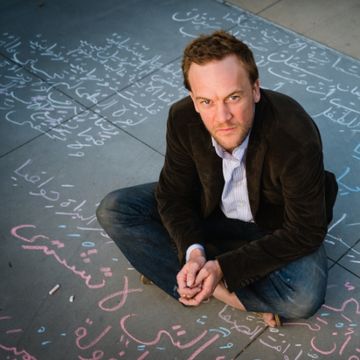
Alexander Key
Alexander Key is a scholar of Classical Arabic literature with interests ranging across the intellectual history of the Arabic and Persian-speaking worlds from the seventh century onwards. Language Between God and the Poets (UC Press, open access) explains Classical Arabic theories about poetry and philosophy to all who are interested in how language produces affect and reflects the world.
The book deals with multiple genres of scholarship in the work of four famous scholars: Ragib al-Isfahani, Ibn Furak, Ibn Sina, and ʿAbd al-Qahir al-Jurjani. Their detailed theories about how language works remain applicable today: we still want to understand how poetry works through syntax to create affect, and we are still interested in the problem of how language, mind, and reality interact. Language Between God and the Poets makes Classical Arabic solutions to these problems available for the first time in twenty-first-century English – within a rigorous and original theoretical framework for the translation of theory. It has been reviewed in TMR, the Journal of Near Eastern Studies, and the Journal of the American Oriental Society.
He is currently working on an under-contract edition and translation of al-Jurjani's Dala'il al-I'jaz for the Library of Arabic Literature. This attempt to introduce Arabic poetics into English critical discourse follows his article on Neoplatonic poetics (al-Hallaj, Robert Lowell, Robert Duncan), his contribution to a kitabkhana dealing with Innovations and Turning Points: towards a history of kavya literature in Comparative Studies of South Asia, Africa and the Middle East, and a JAOS review of Ali Ahmed Hussein’s The Rhetorical Fabric of the Traditional Arabic Qasida in Its Formative Stages. He also curates an Arcade Colloquy "Comparing Literatures: Arabic, Hebrew, Persian, Turkish, Urdu" that came out of the 2018 Trans;form symposium.
Key received his Ph.D. in Arabic and Islamic Studies from Harvard University's Department of Near Eastern Languages and Civilizations in May 2012 and started work at Stanford that same year. He has authored a number of articles on aspects of Classical Arabic literature and culture. These include a study of translations from Persian proverbs into Arabic poetry, a chapter co-authored with Peter Adamson on the debate between grammar and logic, a study of Quranic inimitability in ar-Raghib, and an argument against calling Classical Arabic civilization "humanist."
In 2018, Key guest-edited the Journal of Abbasid Studies, with a special issue on the literary critic ʿAbd al-Qahir al-Jurjani that included an article on al-Jurjani's bilingual theory of translation from Persian into Arabic.
For more details on off-CV academic activities go to Tumblr. For copies of some publications, academia.edu. And for tweets, @AlexanderMKey.
Key is proud to serve on the Board of Governors of Habib University, the Editorial Board of Stanford University Press, and the Board of Stanford's Markaz Resource Center.
Selected Publications
Contact
Research Unit Groups
Research Interests
- Arabic Languages, Literatures, and Cultures
- Language Theory
- Literary and Cultural Theory
- Literary Criticism (history of criticism, theory of literature)
- Persian Languages, Literatures, and Cultures
- Poetry and Poetics
